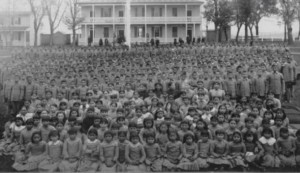Canadian Residential Schools
While researching You Tube videos around the topic of Indigenous property rights, I came across a set of videos describing the Canadian Residential School experience. Although not directly related to this module’s topic, I had to include a couple of them. The second video poignantly illustrates the power of the technology. It is a devastating video to view.
Canadian Residential School Propaganda Video 1955:
https://www.youtube.com/watch?v=s_V4d7sXoqU&feature=related
Canadian Holocaust -Try Not to Cry:
November 7, 2010 No Comments
Northern Ontario indigenous films
Thunderstone Pictures and First Nation Initiative
http://thunderstone.jcmultimedia.com/index.php
http://www.firstnationinitiative.ca/
Michelle Derosier, filmmaker and social worker, from Migisi Sahgaigan, (Eagle Lake First Nation), is behind Thunderstone Pictures and the First Nation Initiative. She is interested in using films to empower – both the participants of the films and audience members — as in the case of these three documentaries.
Sharing Tebwewin (Sharing the Truth)
The trailer: https://www.youtube.com/watch?v=vNLGPntkvIs&feature=player_embedded
An educational documentary designed to help health workers become more “culturally competent” in their work with First Nations people. It features interviews with Dr. Cornelia (Nel) Wieman, the first indigenous woman to become a psychiatrist in Canada. It also features a discussion panel of First Nations Health professionals and interviews with Stella Montour, a Consumer/Survivor advocate. The video tackles the impacts of historical issues like Residential Schools and the 60’s Scoop and draws on the experience and knowledge of Nel and other professionals to illustrate why culturally specific and historically-informed services are an essential and immediate requirement.
Seeking Bimaadiziiwing (Seeking the Good Life)
The trailer: https://www.youtube.com/watch?v=7VYFBApbszE&feature=related
A community-based project made in Thunder Bay, Ontario, Canada. It focuses on the tough issues of racism, depression and suicide among First Nations Youth. It is intended for therapeutic use with clients to encourage participation in group therapy and to spark discussion about these critical issues. It also serves to illustrate the diversity within modern Anishinawbe culture (Northwestern Ontario, Canada) and to point out different healing and spiritual approaches.
Healing Lens
The trailer: https://www.youtube.com/watch?v=Hbyul1vgc8M&NR=1
A documentary of inspiration that brings humanism and personal reference to the unfolding story of this generation of native youth. The film exemplifies the far-reaching effects of Canada’s racist policies on today’s young people. In real life, each of these four remarkable young people are overcoming the past and are engaged in unique ways of healing themselves – ways we can all learn from.
Also see http://www.doxafestival.ca/media/files/DOXA_2010_Healing_Lens.pdf
September 27, 2010 No Comments
Mission and Power: Stories of residential schools experiences in Canada
“Chapter 4: Mission and Power” (2010). In Edinburgh 2010 Volume II: Witnessing to Christ Today (Daryl Balia & Kirsteen Kim, eds). Regnum Books International, Oxford, U.K. pp. 86-115
http://www.edinburgh2010.org/fileadmin/files/edinburgh2010/files/Study_Process/reports/E2010%20II-whole-final.pdf
To commemorate the Centenary of the World Missionary Conference, held in Edinburgh 1910, an intercontinental and multi-denominational project developed, now known as Edinburgh 2010. Part of the project was a process of collaborative reflection on nine study themes and seven transversal themes identified as being key to mission in the 21st century.
In 2008, representatives from approximately 20 Christian organizations in Canada met to identify a Canadian contribution to Edinburgh 2010. An interest emerged in the theme of Mission and Power as expressed in the churches’ relations with indigenous peoples.
The study team proposed an approach featuring information and reflections on Canadian residential schools. “The study team wrestled with the subject of the ‘power’ of the pen, recognizing that in choosing writers, power would be given to some over the many others who could have contributed. Since indigenous peoples’ voices are underrepresented in the literature, the team invited three indigenous authors to write their stories drawing on material from their personal and family’s experiences of residential schools.” The fourth story comes from a Canadian clergyman of European origin from one of the churches which ran the schools.
The stories are followed by excerpts of twelve international responses to these stories from individuals (indigenous and non-indigenous) who compared and contrasted experiences of mission and power in their contexts (e.g. Wales, South Africa, Gaza, Peru). These responses can be found in full at: http://www.edinburgh2010.org/en/study-themes/main-study-themes/mission-and-power/core-group-work.html
September 27, 2010 No Comments

